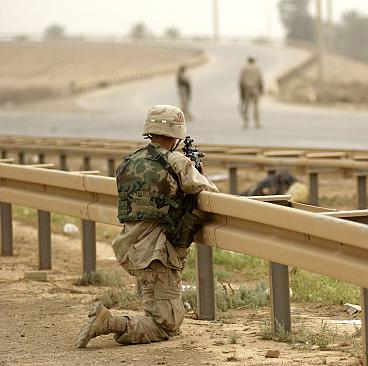Military Intervention in Iraq and Syria: Five questions to SP Foreign Affairs spokesman Harry van Bommel
Military Intervention in Iraq and Syria: Five questions to SP Foreign Affairs spokesman Harry van Bommel
Military Intervention in Iraq and Syria: Five question to SP Foreign Affairs spokesman Harry van Bommel.

Irak (Flickr: eraserhead5, CC by-nd/2.0)
Everyone’s rushing to bomb ISIS. Why isn’t the SP?
You can’t combat terrorism with aerial bombardment. ISIS fighters mingle with the general population, who will therefore also become victims of the military campaign which has now, under the leadership of the US, begun and which by their own account is going to last for many years. In addition, the Sunni people will be driven still further into the arms of ISIS. They have after all long been ignored and excluded from any prosperity by the government in Baghdad, which must be forced to cooperate with them, but also with the Kurds. That political process has no longer any chance at all, thanks to the bombing. In fact what’s happened is that a military answer has been given to what is a political problem, and for that reason it won’t work.
But you can’t just look away from what’s happening in Iraq and Syria, can you?
No, certainly not, and that isn’t what we’re doing. ISIS’s actions are horrific beyond words, and something has to be done about that. In the first instance this is the responsibility of armed forces in the region, amongst others those of Iraq and of the Kurdish Peshmerga fighters. Where genocide is threatened, international intervention can certainly be defended, which is why we spoke out in favour of the military effort which made it possible for thousands of Yezidis to flee Mount Sinjar. The first priority must now be to offer more humanitarian aid to the enormous stream of refugees who have to be accommodated in the region. The UN refugee organisation UNHCR is crying out for more support. We should be making a contribution to this instead of sending F-16s. That would help more people.
Why is the Netherlands sending F16s to combat ISIS, but not in Syria?
Unlike in Iraq, there is no mandate under international law for military action in Syria, so for the moment such action is limited to one country. The US is of course bombing in Syria. As was demonstrated in the past, in 2003, in the war against Iraq, that country doesn’t take much notice of international law. The Dutch government has ‘sympathy’ for the American attacks on Syria and is thus giving political support to illegal military action. In addition to that, these air raids represent direct support to the dictator Assad who has been responsible for 200,000 deaths in Syria in recent years. Furthermore, the same goes in Syria as in Iraq: you can’t combat terrorism effectively with air raids. It will only feed hatred of the west and so it’s not to be wondered at that the Dutch intelligence services are warning of attacks in the Netherlands.
How should we tackle the looming threat of ISIS?
The core of the current conflict in Iraq is political. In my view the new government in Iraq has to make a serious fist of a reform plan that will lead to the Sunni community, amongst which ISIS finds its support, feeling represented. As things stand there’s no sign of this. In Syria it’s of the utmost importance that, to start with, a ceasefire is agreed, at least between the Assad regime and more moderate armed groups. That’s necessary in order to take a step towards a political solution to this horrific civil war. Supplying arms to these countries, to whatever group, amounts to adding fuel to the fire. Support for groups such as ISIS must be cut off, also. In concrete terms this means that more pressure must be put on the Gulf States, amongst others, including Saudi Arabia, that give financial and ideological support to such groups. In addition, Turkey has to close the border to fighters heading for the area. As for the danger to the Netherlands, it’s important that more money goes to the intelligence services, because they need to keep an eye on radicalised youth, which is a labour intensive task.
What lessons can we learn from earlier western military interventions?
The most important lesson to be drawn is that western military interventions rarely lead to positive results and often lead to an increase in violence. Afghanistan, Iraq and Libya show that. The violence in these countries is at an unprecedentedly high level. The threat from terrorism thirteen years after the attacks of 11th September 2001, far from having been reduced, has increased enormously. Never before have there been as many Al-Qaeda-like groups as there are now. In short, the military should be handled with great care, because it often has a counterproductive effect. That can’t be sufficiently emphasised. Also, supplying arms to groups that appear to be on our side is a dicey business. Today they’re our friends but tomorrow we could be looking at them through the sights of our rifles. .
Read more in the opinion article on this issue written recently by Harry van Bommel: Military campaign against ISIS will lead to more violence.
